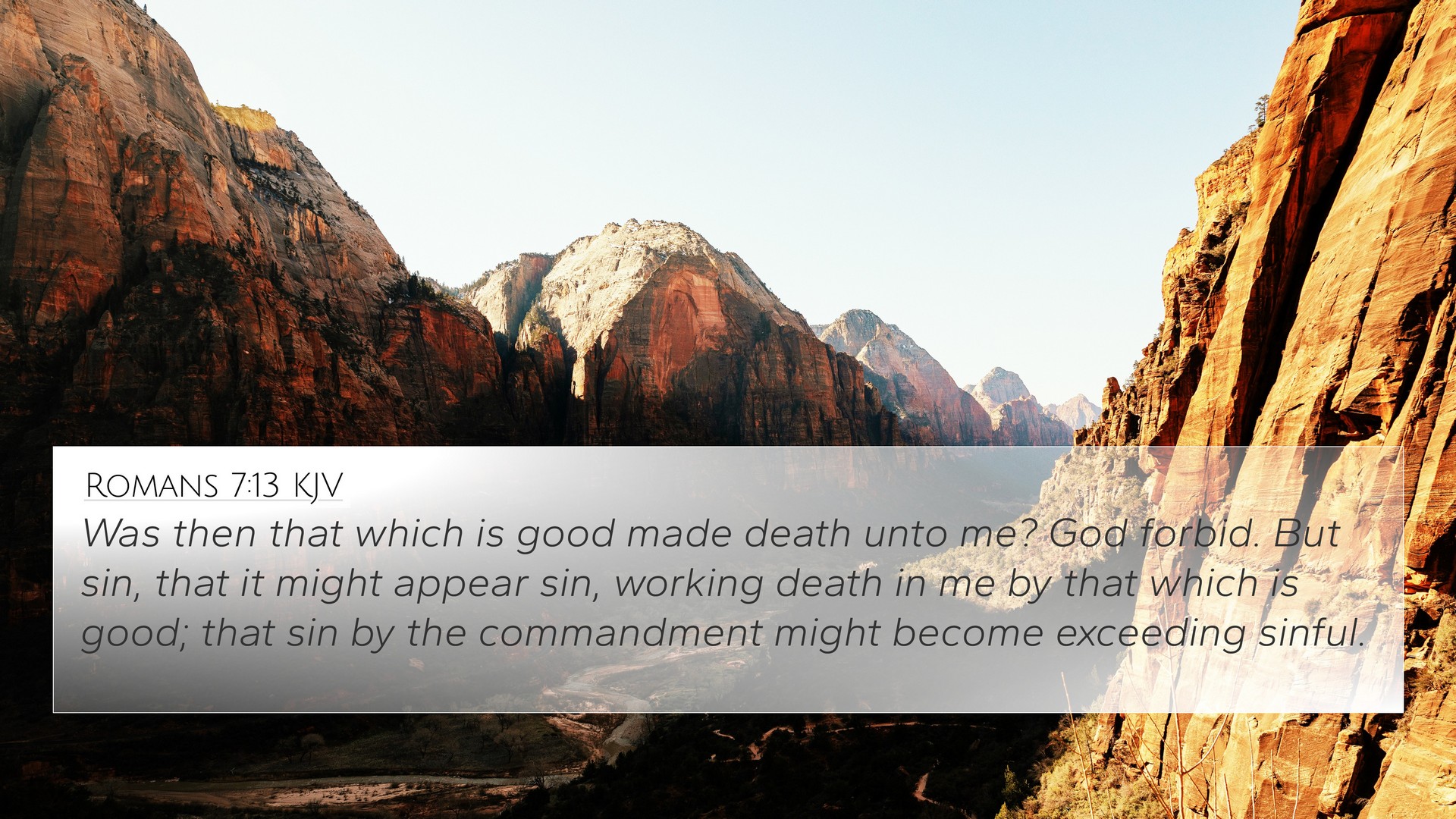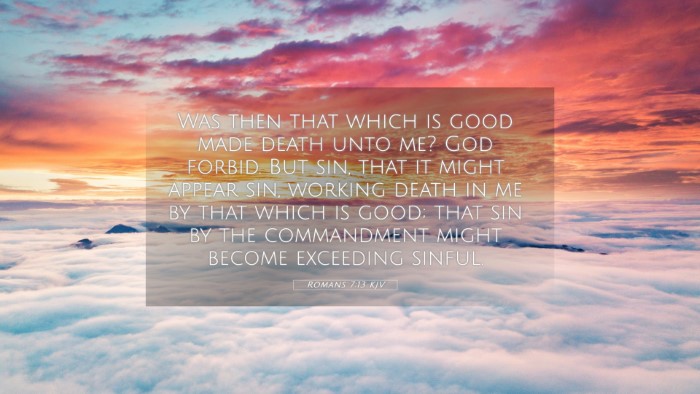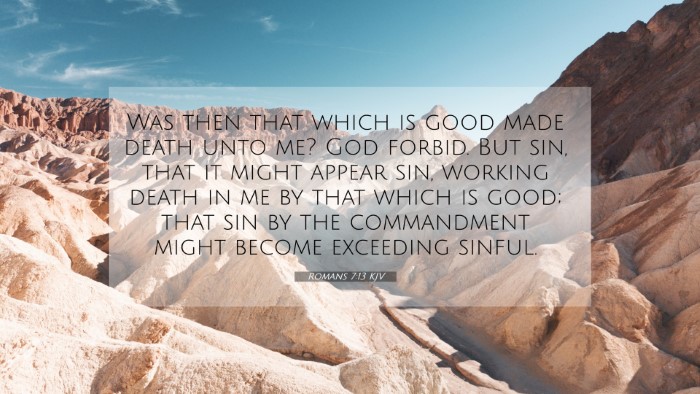Old Testament
Genesis Exodus Leviticus Numbers Deuteronomy Joshua Judges Ruth 1 Samuel 2 Samuel 1 Kings 2 Kings 1 Chronicles 2 Chronicles Ezra Nehemiah Esther Job Psalms Proverbs Ecclesiastes Song of Solomon Isaiah Jeremiah Lamentations Ezekiel Daniel Hosea Joel Amos Obadiah Jonah Micah Nahum Habakkuk Zephaniah Haggai Zechariah MalachiRomans 7:13 Similar Verses
Romans 7:13 Cross References
Was then that which is good made death unto me? God forbid. But sin, that it might appear sin, working death in me by that which is good; that sin by the commandment might become exceeding sinful.
Uncover the Rich Themes and Topics of This Bible Verse
Listed below are the Bible themes associated with Romans 7:13. We invite you to explore each theme to gain deeper insights into the Scriptures.
Romans 7:13 Cross Reference Verses
This section features a detailed cross-reference designed to enrich your understanding of the Scriptures. Below, you will find carefully selected verses that echo the themes and teachings related to Romans 7:13 KJV. Click on any image to explore detailed analyses of related Bible verses and uncover deeper theological insights.

James 1:13 (KJV) »
Let no man say when he is tempted, I am tempted of God: for God cannot be tempted with evil, neither tempteth he any man:

Galatians 3:21 (KJV) »
Is the law then against the promises of God? God forbid: for if there had been a law given which could have given life, verily righteousness should have been by the law.

Romans 7:8 (KJV) »
But sin, taking occasion by the commandment, wrought in me all manner of concupiscence. For without the law sin was dead.
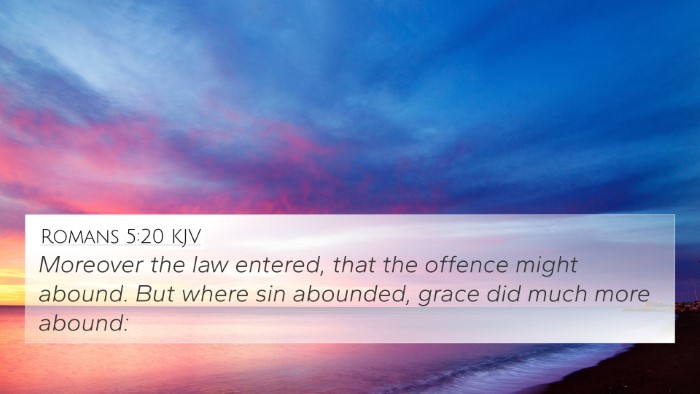
Romans 5:20 (KJV) »
Moreover the law entered, that the offence might abound. But where sin abounded, grace did much more abound:
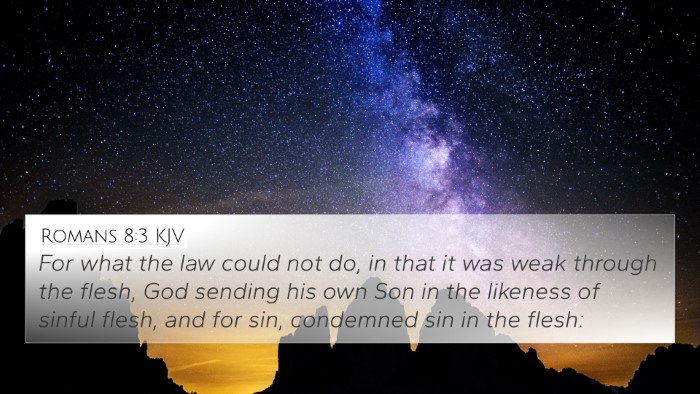
Romans 8:3 (KJV) »
For what the law could not do, in that it was weak through the flesh, God sending his own Son in the likeness of sinful flesh, and for sin, condemned sin in the flesh:
Romans 7:13 Verse Analysis and Similar Verses
Understanding Romans 7:13
Romans 7:13 states, "Has then what is good become death to me? Certainly not! But sin, that it might appear sin was producing death in me through what is good, so that sin through the commandment might become exceedingly sinful." This verse is pivotal in understanding the nature of sin and the law.
Summary of Key Insights
The Apostle Paul elaborates on the relationship between the law, sin, and death. Through the insights from renowned commentaries, we can gain a deeper comprehension of this verse and its implications in Christian doctrine.
1. The Law as a Revealer of Sin
Matthew Henry notes that the law, while inherently good, serves to reveal the sinfulness of sin. It is through the commandment that one can truly understand the nature of sin and its consequences—death. The law does not cause death but rather exposes it.
2. The Nature of Sin
Albert Barnes emphasizes that the existence of the law makes sin "exceedingly sinful." Without the law, sin would not be recognized in its true form. Thus, this verse speaks to the greater understanding of human depravity when contrasted with the holiness of the law.
3. The Role of Goodness
Adam Clarke asserts that the verse illustrates a paradox: what is good (the law) is not the cause of death, rather it magnifies the destructive power of sin in the human experience. John 8:32 ("And you shall know the truth, and the truth shall make you free") reflects how understanding leads to liberation from sin's power.
4. Connection to Other Scriptures
To further explore the depth of Romans 7:13, we can find connections with several other Bible verses:
- Genesis 2:17 - The command regarding the tree of knowledge illustrates the potential for disobedience.
- James 1:15 - "Then, when desire has conceived, it gives birth to sin; and sin, when it is full-grown, brings forth death," which mirrors Paul's argument on sin leading to death.
- Galatians 3:24 - The law serves as a tutor to bring us to Christ, reinforcing the idea that the law exposes sin.
- 1 John 3:4 - Defines sin as lawlessness, emphasizing the relationship Paul discusses.
- Romans 8:3 - "For what the law could not do in that it was weak through the flesh, God did by sending His own Son," relates to the tension between law and sin.
- Romans 6:23 - "For the wages of sin is death," encapsulating the grim outcome of unaddressed sin.
- Matthew 5:17 - Jesus fulfills the law, hence, it is essential to understand how the law sets the standard for righteousness.
Engaging with Cross-References
In examining this verse, we can employ tools for Bible cross-referencing to see how it fits into the broader theological framework of scripture. It is crucial for readers and scholars alike to utilize resources such as Bible concordances and reference guides, which facilitate a better grasp of how various biblical texts interlink. By employing a cross-reference Bible study method, deeper meanings can be unveiled.
Thematic Connections
This exploration leads to rich thematic connections and parallels throughout the Bible:
- The Law and Grace: Understanding Romans 7:13 in light of the subsequent chapter about grace and freedom (Romans 8).
- Sin and Redemption: Highlighting the need for redemption through Christ, initiated by acknowledgment of sin.
- Old Testament Law and New Testament Grace: Identifying transitions from the law to grace as expressed through various scriptures.
Conclusion
Romans 7:13 serves as a crucial text for understanding the interplay between law, sin, and death. It challenges believers to contemplate the true function of the law and the grave nature of sin. As we explore cross-references, we gain insights into the overarching narrative of redemption throughout the Bible, enriching our understanding of scriptural themes.
